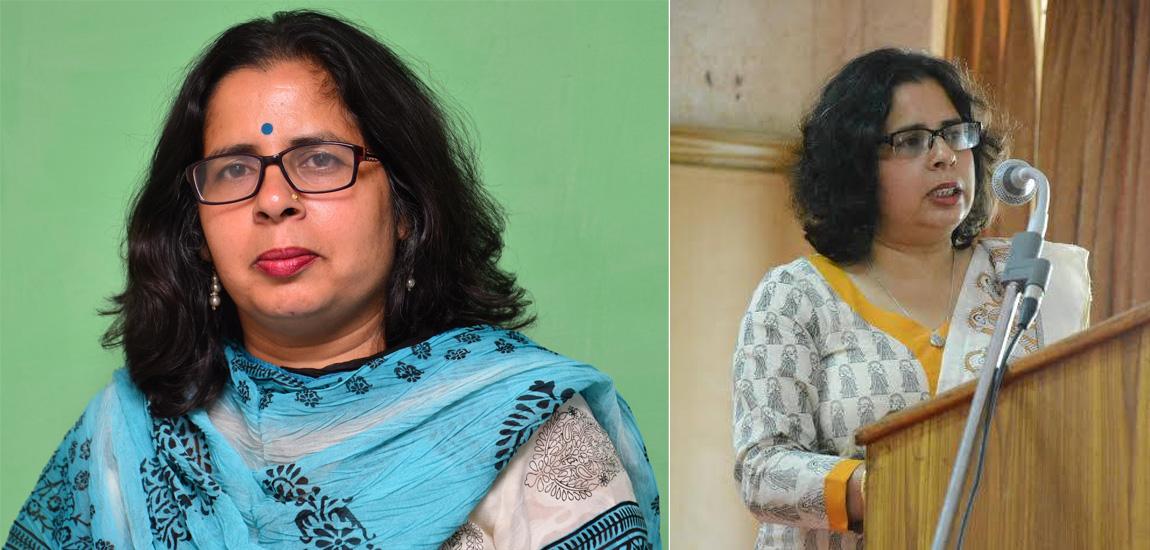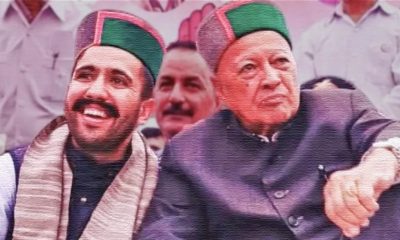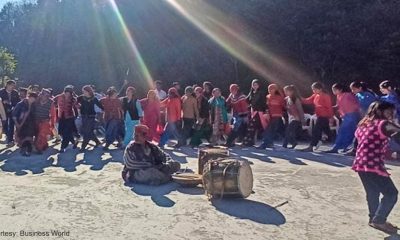Change Makers
Few Questions with Archana Phull – Himachal’s eminent journalist

Archana Phull is a well known name among eminent senior journalists of Himachal Pradesh. She has been a voice of many brushed off tribes of the state, which otherwise remain buzzing with unvarying political humdrums. She was born in Palampur, Kangra district. She received her school education at the Kendriya Vidyalaya, Palampur. Currently, she is discharging her journalistic duties as the Bureau Chief, The Statesman, Shimla.
In her career of over 23 years, Phull continues to this day, revealing unflattering truths of the hills to bring about a change. Today, we bring to you Few Questions with Archana Phull, an agent of change from the print.
1. What/who inspired you to take up journalism?
My entry into journalism was by chance. I did my Post Graduation in Agricultural Economics from CSK Himachal Pradesh Krishi Vishvavidyalaya, Palampur in 1991. After that while I was waiting for the M.Sc viva, I did one year Bachelor degree in Journalism and Mass Communication (BJMC) from Himachal Pradesh University on the insistence of my father, a creative writer. But I was shy and was not keen on reporting and writing. I was good in declamation and debates, but wasn’t outspoken in routine. So, I joined the PhD at Palampur varsity.
Incidentally, I got a part time job with a national English daily at Palampur simultaneously. Being science student, I found the report writing tough and was always short of words. However, I focused on stories based on developments in agriculture initially. In March 1994, I got a call from the same national daily to work in Chandigarh. Despite reluctance by mother and my own hitches, my father told me to pack my bags for the new role. I left the PhD behind.
Ultimately, I discovered that I was made for journalism and nothing else.
2. What a great career it has been for you in this role, which would be your most memorable assignment?
I am so lucky that the destiny unknowingly took me towards my dream career, which I have enjoyed every moment. Over 23 years journey, the profession became my passion. I am self-motivated. I saw hard times also in the profession, but that didn’t have affect my urge to work hard.
Every story I do is my favorite as I write everything with a sense of belonging.
Still, I feel my well researched write ups on the struggle of hill women in rural areas, including the single and tribal women, are the ones most memorable for me. Being a woman, I have tried to do justice to my writing on women issues.
One story from remotest Tissa area in Chamba in 1996, which highlighted the plight of poor illiterate women-who were falling in the trap of ‘unregistered marriages’ with employees posted there and were being deserted when their ‘husbands’ were transferred out from the backward area-was my first such exposure on women issues in Himachal. My first investigative story 20 years ago was also on poor widows in an area near Dharamshala, where they were being duped of relief money by a local lawyer who used to fake their thumb impressions.
3. You recently wrote a piece on “Fighting Customary Inequality”, how grave is the evil of inequality in the hill state in your opinion?
Yes, I have raised this issue at different times over the last decade for I have seen the pathetic condition of tribal women on ground.
Himachal Pradesh is a progressive state and female literacy here is increasing impressively. But the hill society is conservative and, to an extent, orthodox when it comes to treating single women. The widows, deserted, divorced and unmarried women, whose numbers are quite high in hill state are isolated by their families and society in villages. They are almost abandoned with kids. They are cursed for the happenings which are not in their hand. In tribal areas of the state, particularly, Kinnaur and parts of Bharmour, the women are facing discrimination as they don’t have the right to inherit ancestral property as per an age-old customary law. The tribal society is perhaps not prepared to amend or scrap the customary law as of late. In corridors of the Supreme Court did give a judgement in favour of the tribal women sometime back, but the issue then reached the corridors of court.
The silver lining is that a strong movement is going on in the state on these two issues, separately- One by Ekal Nari Shakti Sangathan for the single women in Himachal who are harassed in the conservative social se set-up in hilly state. Another by Mahila Kalyan Parishad in Kinnaur to get the discriminatory customary law scrapped.
4. Do you think responsible journalism still exists?
I do feel that there is deterioration in media over the years and there is lot of commercialization. The race to be ahead of others, the culture of ‘breaking’ and the urge to be read or heard at any cost has affected the authenticity and credibility of media reports. Increasingly, the ethics are being given a go-by, the objectivity and quality is being compromised. The mushrooming of local newspapers, and of late, tabloids and magazines, printed locally even in small towns by individuals for personalized income is another challenge. But we can’t blame individuals for this. We need to analyse the reasons in totality.
5. Do you regard digital media/journalism as an important addition in meeting the overall journalistic goals?
Yes. It is so as the younger generation is more inclined to see the news on-line. Rather, with the advent of digital media, the audience has become global. People sitting in any part of the world can access the websites or on-line editions. The digital media however requires speed and brings along a lot of responsibility. The accuracy becomes very important because of wide access of the report with one click.
6. Your message for our readers.
Media is an important tool for social change. If handled properly, it can work wonders. The news website Himachal Watcher is doing stories with utmost sensitivity and has the will to dig the truth for its readers. Objectivity, hard work and positive perspective are must in journalism and I think Himachal Watcher is carrying all these virtues along.








 Home Decor Ideas 2020
Home Decor Ideas 2020
